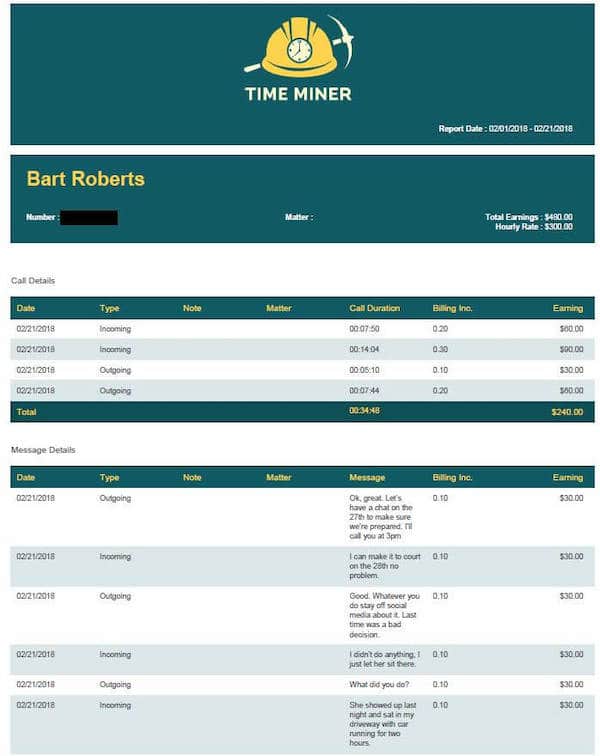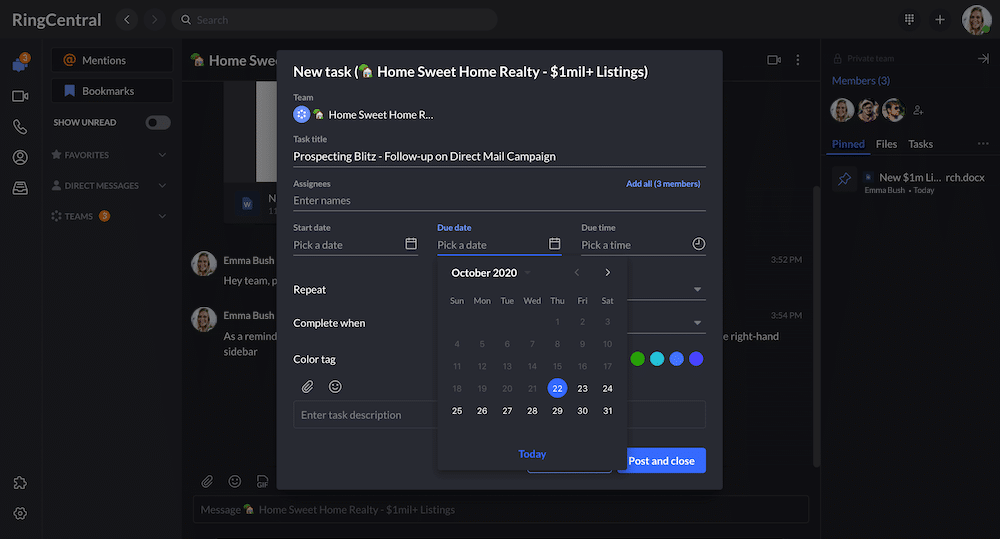Managing a law firm business is no easy feat. Whether you’re running a small law firm or expanding to become a larger legal practice, there are undoubtedly going to be some bumps on the road to success.
When you’re offering legal services you need to ensure you’ve got a strong team, great marketing, and excellent client relationships. But, what else?
Here, we delve into what it takes to manage a law firm. This is your complete guide to efficient law office management.
In this guide, you will learn:
- How do you manage a law firm?
- What is the basic organizational structure of a typical law firm?
- 3 key types of software that law firms use
- 5 tips for a more effective law firm
See how these four law firms adapted their operations to work from anywhere—while still providing a great client experience. Download the free case study playbook!
How do you manage a law firm?
So, what does it take to manage a law firm? Well, effective leadership coupled with organizational skills makes for a solid foundation.
That’s because managing a law firm isn’t just about winning over the best clients, but also about how well structured your business is. Not being able to cope with a growing workload due to poor administrative measures could be a pitfall of an otherwise promising enterprise.
Managing a law firm also requires excellent levels of communication, and the strategic implementation of useful software can help you achieve this. Many employees within the firm may work remotely, particularly if your firm has partners nationwide or across the globe. The software you use, then, needs to accommodate this. That’s why a cloud phone system could be beneficial:
What is the “boss” of a law firm called?
A law firm’s hierarchy can be split into multiple levels. At the very top, the boss of the law firm is called a managing partner. They’re in charge of the other partners and the managing committee (if the firm has one).
Many firms organize their roles based on a basic organizational structure, which gives the team an idea of how they fit and who they can report to. This structure should also serve as a reminder of job role expectations and the responsibilities each person has in your firm.
Learn how to run a remote-friendly legal practice with this in-depth playbook.
What is the basic organizational structure of a typical law firm?
The organizational structure of a law firm is fairly standard across the legal industry. Often it takes the form of a limited liability partnership (LLP). Here’s a breakdown of each job title (in hierarchical order according to a basic organizational structure) and the role they play within the firm.
- Managing partner: Runs the operations of the firm. Often both the law firm manager and part owner of the firm.
- Partner: Underneath the managing partner are partners. Along with the managing partner, they are generally also owners of the firm. They’re the most experienced team members, so they receive a share of the overall profits. They may also be referred to as shareholders or members.
- Associates: These are attorneys appointed by the firm, but they are not owners. Associates typically have less experience than partners, so their work is often reviewed by partners and they may not have much interaction with clients during their first few years at the firm.
- Marketing directors: Legal marketing directors are tasked with attracting new clients to the firm. They work with PR companies and agents to create a positive image for the business and develop an overall marketing plan.
- Contract attorneys: Sometimes a law practice will hire external contractors for part-time work. They are paid on an hourly basis when they have particularly busy periods.
- Law clerks: Law clerks are often law school students who are trying to gain experience in a law firm. They assist the associates with their duties, including time-consuming work, to take the pressure away from attorneys.
- Paralegals: They play a crucial role within the firm, supervising attorneys with their cases. They usually have practical working knowledge of law and administrative systems, making them invaluable to a law firm. They can be members of the bar association but, depending on jurisdiction, this isn’t mandatory.
- Legal secretaries: Legal secretaries help to keep the law office organized and efficient. They help with the smooth running of the firm and assist attorneys in administrative duties.
What software do law firms use?
1. Communication
RingCentral
RingCentral is an all-in-one cloud-based solution for law firms that offers team messaging, video conferencing, and a phone system all in one app
To start, its video conferencing capabilities make it easier to conduct face-to-face meetings for clients and colleagues alike. As a law firm, forming good client relationships is vital. By making yourself available through video calls, phone calls, or messaging, your clients are going to feel valued and engaged.
What’s more, meetings can be scheduled at the drop of a hat. This is critical for follow-up and keeping clients apprised of details of their cases. Working in remote teams has never been easier. This video explains more about online conferencing:
RingCentral’s robust and versatile software allows you to host video conferences with ease, which eliminates the need for clients to travel to you, which presents an opportunity to work on a more global scale.
And if global expansion is your goal, then you’ll be glad to know that RingCentral’s other features are designed to allow your firm’s employees to work from anywhere, on any device:
- Team messaging
- HD video meetings
- Remote customer service capabilities
- Integration with Google Workspace and hundreds of other apps, like Time Miner
- Automation of manual, time-consuming tasks
- Privacy (by shielding your personal number)
Privacy is crucial when you’re constantly making and receiving calls, sometimes from new contacts. The RingCentral app gives you the option to mask your real phone number when using your personal smartphone. There’s no longer a need to carry around two phones, now you can have everything in one place!
👀 Find out how one law firm provides a 24/7 client experience—without being online 24/7—with RingCentral.
More and more often, you’ll see witnesses appearing in court via video link. Whether this is because they were unable or unwilling to travel, witnesses are now able to give testimonies in the same way as if they were in the room. Not only this, RingCentral’s video conferencing feature can also give you the ability to securely film depositions from anywhere, with high-quality audio and video.
🕹️ Get a hands-on look at how some of the top law firms in the country are using RingCentral by booking a product tour:
💰 You can also use this calculator to see roughly how much your firm could save by using RingCentral to support your team’s communication with each other—and clients.
NetDocuments
An important part of communication is the ability to share files across teams. Law practice management is all about collaboration, which is why file sharing software is another crucial element of legal technology.
NetDocuments enables you to edit and share documents within the team, as well as to others outside the firm (but only those who you grant permission). It can also be integrated with your email account, thus saving time and boosting productivity.
And, unlike some other file sharing software, it alleviates the confusion of having two people on one document at the same time, with its handy “Check-in” feature. Users can edit the document without fear of being overwritten before they check out.
2. Timekeeping
Time Miner
If you like RingCentral, then you’ll love Time Miner, a timekeeping app that can be integrated with it. It’s specifically designed for attorneys and the legal profession.
As a law firm, it can be difficult to keep track of your billable hours. Time Miner automatically creates billable time entries out of messages, calls, SMS, and faxes received through RingCentral:

You can then set a date and time period, and Time Miner will collect all your billable hours into one handy report. This includes metrics like the client service, date, duration, and the dollar value, based on your hourly rate.
They’re serious about security, too. Information and data is accessible solely on your device, and they use encryption and security to keep it safe.
Time Miner is a law firm’s dream, completely eliminating the stress and hassle of trying to figure out billable hours through spreadsheets and notes.
Time Miner is also fully integrated with Clio, a leading legal practice management and billing software.
You can mine back 30 days to see calls and texts. If you need to go back further, you’ll need their special “Deep Dive” feature, which can go back years in your email history.
Timecamp
Timecamp is time tracking software that enables you to keep track of your team’s performance. When it comes to law firm management, spreadsheets and reports can sometimes take over your other daily tasks—you know like the practice of law. This software is a good solution. It lets you access all the important information about your projects in one place with an easy-to-use interface.
You’ll be able to track your team’s hours easily, optimize your workflow, and even keep you on track with budgets. And with its Chrome extension, you can also track hours on Trello and Asana.
With Timecamp you can also:
- Monitor work from individual staff members within your practice group
- Analyze time-consumption on particular tasks
- Generate reports on employee productivity to aid project management
This takes the guesswork out of team work!
3. Dictation
Dragon
Dragon is a professional dictation app that allows you to transform voice to text. Years ago such legal tech simply wasn’t available for law firms, and now it’s making life a lot easier!
You can create documents of any length, edit them, and then share them directly from your smartphone via Dropbox, Evernote, and other file sharing apps. You can even bold and underline certain words and sentences.
What’s more, Dragon can handle specialized industry vocabulary—perfect for law terminology. And its constantly developing technology means it improves as it adapts to your voice.
Dragon is accurate and fast, which is why many legal professionals use Dragon as their go-to dictation software, no matter what their practice area.
Speechmatics
Speechmatics is another dictation platform favored by successful law firms for its ability to transcribe in any context in real time.
Powered by machine learning, this software is an excellent choice for client meetings and conferences. It knows 74 languages, which can be beneficial if you’re a global law firm. Now your core team in New York or elsewhere in the United States can easily communicate with colleagues anywhere in the world.
Here’s why it’s a must for any law practice:
- It’s constantly updated with new languages to cover many industries.
- The software detects a change in the speaker.
- It’s highly accurate.
- There’s a custom dictionary feature to add specific words.
- It features advanced punctuation.
Practically every law firm needs speech-to-text software in one form or another, and Speechmatics is a great choice to streamline your workflow.
5 tips for a more effective law office
1. Use team management software
Using team management software can transform the way you work. Even if you’re a small business with few members of staff, it’s good practice to work in a more collaborative way. If only to prepare yourself for when the team does eventually grow! Team management software will boost your communication efforts and allow for a smoother workflow overall. In other words, it’s vital for business development and law firm management.
For example, in the RingCentral app (which also has video conferencing and messaging capabilities), you can see which members of your team are working on which tasks and how far along they are—and set deadlines and even color-code tasks for easy organization:

You can also send files and add notes to shared documents, which can then be accessed by others in the team.
2. Invest in marketing
Attracting clients is a crucial part of law practice management. That’s why you need to invest in marketing. Many law firms appoint a marketing director. They will network and entice valuable clients to the business. But, you could take it further and create a whole marketing department.
The marketing director will boost the profile of the company, and can sometimes even be the face of the company when press opportunities present themselves.
3. Master the onboarding process
It’s easy to see why the onboarding process is one of the most important parts of the hiring process in the legal niche. A good attorney can help increase your profitability. But if a new hire has a poor experience in the first few months of working with you, they may leave. And you don’t want to develop a high turnover rate.
By guiding your new employees, you’re nurturing their skills and deepening their knowledge of the industry, which can only stand to benefit you in the long run. Check-in with your employees every couple of months to see how they’re getting on and offer support if needed.
4. Work on your strategy
You need to develop a great business strategy and implement it effectively. A good strategy will include your business plans, goals in the short-term and long-term, and also an analysis of the industry and how you’re going to break into it. Because, let’s face it, you may not be the only law firm on the block. A strategy will help develop your identity and eventually help you gain valuable clients.
5. Make your practice available
The days of only being reachable by landline phone are long gone. And that’s a good thing. As an attorney, you need to be reachable at all times by clients and colleagues. Using software like RingCentral will help you stay accessible no matter where you are thanks to its team messaging feature and remote work capabilities. You’ll never miss out on an important yet impromptu meeting again.
Are you ready to lead your firm through change?
Running a small law firm can be a daunting experience. If you’re an attorney who’s broken away from a bigger firm to start out on your own, you may be coming across certain hurdles for the first time as a firm leader.
Try out these office tips
By taking the advice from this guide, you should be well on your way to embracing your new law firm management responsibilities. Just follow these three steps:
- Build a strategy.
- Invest in good software.
- Hire the right people.
And be ready to lead your firm through change. Adapt as new technologies become available and use them to make life easier. Forming good client relationships, having a solid team, and developing great marketing techniques will stand you in good stead for a successful career in law.
Your next steps in law firm management…
Managing a law firm calls for effective leadership and excellent communication skills. Because though there are many key roles in an efficient law office, none of them would be able to reach their full potential without the hard work of the others. A law office is a tight knit unit, and collaboration is crucial.
As we’ve seen, communication, time-keeping and dictation are all essential when running a law firm. To give yourself the best head start in your next steps, ensure you’re using the best software for your team. By investing in great software, you can streamline your workflow and reap the benefits in the long run.
Originally published Dec 15, 2020, updated Jul 16, 2024





